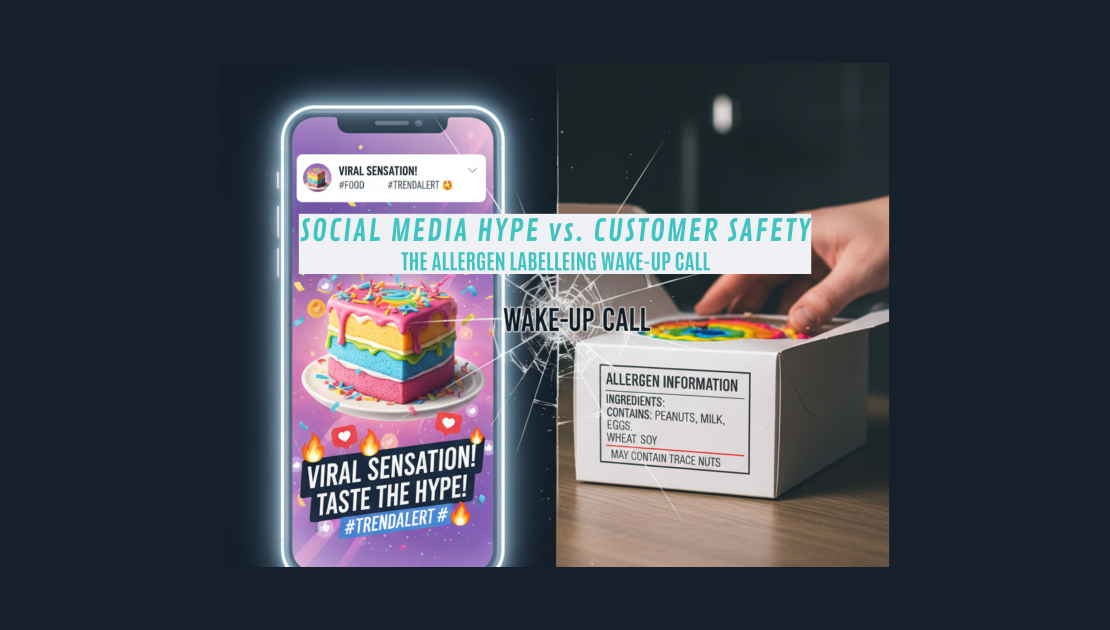The Allergen Labelling Wake-Up Call

Social Media Hype vs. Customer Safety: The Allergen Labelling Wake-Up Call
One minute, a food product is all over social media. The next, it’s the must-have item flying off the shelves. We saw it happen with the viral “Dubai chocolate.” But when a product goes from a niche trend to a nationwide craze this quickly, a serious risk often gets left behind: compliance with basic food safety law.
The clash between viral fame and legal duty was thrown into sharp relief recently here in the UK. A popular brand of pistachio cream cake, the ‘Arrivo Pistachio Cream Dubai Cake’, had to be pulled from stores in an urgent recall. The cake itself was fine. The problem? The label. It failed to list a whole host of potential allergens; eggs, gluten, milk, nuts, peanuts, soya, and sulphites in English. For a customer with a serious allergy, that’s not just a simple oversight; it’s a potential trip to the hospital. This isn’t an isolated incident. It’s a clear sign that trendy imported foods are “outpacing food safety,” hitting UK shelves before they meet the strict labelling laws that keep people safe.
This Isn’t a Translation Issue, It’s a System Failure
It’s easy to dismiss the Dubai cake recall as a simple translation mistake. But if you work in food safety, you know it points to a much deeper problem: a breakdown in the manufacturer’s and importer’s own control systems. UK regulations are perfectly clear: the 14 major allergens must be declared and emphasised on the label. This isn’t just bureaucratic box-ticking; it’s a legal line in the sand.
This is exactly where a Hazard Analysis and Critical Control Points (HACCP) plan stops being a folder on a shelf and starts being a practical tool. A solid HACCP plan maps out every potential risk. When you’re selling in the UK, the final labelling stage is a critical checkpoint. The mission-critical task? Making absolutely sure the packaging is legally compliant for a British customer. This one check is what stops a product from becoming a public health hazard and prevents a brand from facing the financial and reputational nightmare of a recall.
A Global Problem: Lessons from Turkey
Don’t think for a moment this is just a UK issue or one that only affects trendy start-ups. Huge, established global brands can get caught out by different national rules, which proves you can never take your eye off the ball. In a telling example, several well-known products from the major Turkish manufacturer Ülker were recalled in the US by the FDA. The root cause was fundamentally the same as the Dubai cake issue: undeclared allergens on the packaging.
What this teaches us is that compliance doesn’t travel. The systems that work perfectly well in your home country might not be enough for an export market. It highlights the urgent need for manufacturers to have their processes, especially allergen controls and labelling, audited against the specific legal standards of every single country they plan to sell in. You have to get your systems checked to ensure they are fit for purpose.
Moving from Reaction to Prevention
These recalls are more than just headlines; they are expensive, damaging lessons in the importance of proactive food safety. It doesn’t matter if you’re a small business jumping on a viral trend or a multinational corporation. The core responsibility is the same: you have a duty to protect your customers.
Waiting for the recall notice to land on your desk is simply too late. The real work is in building a robust, preventative system that is designed to catch these kinds of errors long before they ever get near a shop shelf.
For professional support with your food safety management systems in the UK, get in touch with our team today. For our partners and contract manufacturers in Turkey, our expert local team is ready to assist you at fevkalite.net.
